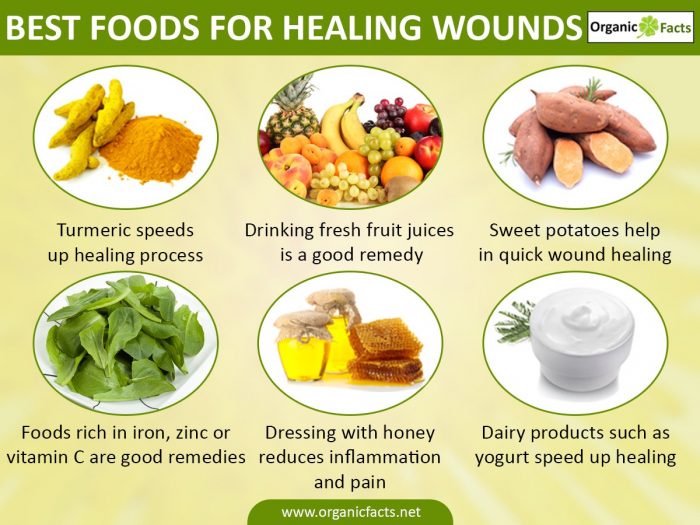When you have a wound such as a pressure injury (formally known as pressure ulcers or sores), diabetic foot ulcers, surgical wounds, full or partial thickness wounds, burns and more, what you eat makes a major difference in the rate of your wound healing. There are various food items that can help speed up the healing process of wounds, whether they are severe or moderate. These food items and additional vitamins and minerals help to provide the necessary growth of new skin tissue and improve blood flow.
Note: It is important for those who have Type 2 Diabetes Mellitus to optimally control blood glucose levels if a wound is present. Poor wound healing and infection is often a result of uncontrolled diabetes. In an animal study conducted by a team of Japanese researchers and published in the Medical Archives Journal, it was discovered that Spontaneously Diabetic Torii (SDT) fatty rat (with type 2 diabetes) showed a delayed wound healing as compared to the normal rats. However, once it was administered orally with sodium glucose, a glycemic control, its impaired wound healing showed signs of improvement. [1]
Table of Contents
Foods and Supplements for Wound Healing
The food items that can help cure your wounds faster include:
Turmeric
Turmeric is a well-known spice that is popularly used for the treatment of wounds. Curcumin, an antioxidant present in turmeric, helps in lowering inflammation and speeding up the healing process. Simply apply a paste of turmeric on the wound and wrap it with a cloth for speedy healing but before doing so, check with your healthcare provider to ensure this is safe. This is still a common practice in many parts of Asia.
Oral Nutrition Supplements
It is recommended to consider one’s current nutrition and mental state. For example, those who are elderly and have wounds might have more difficulty with healing and increasing their calorie and protein needs due to the decreased appetite that happens commonly with advanced aging. Dietitians recommend the consumption of high calorie, high protein shakes such as Boost, Ensure Enlive, Glucerna (for diabetics), Nepro (for those with kidney disease or on dialysis), or Kate Farms (for those with food allergies and intolerances). These shakes are convenient and an easy way of ensuring proper protein intake. There are many options to consider when selecting an oral nutrition supplement and these can be purchased at your local grocery or convenience store.
Dairy Products
Dairy products such as milk and yogurt can aid in the healing process of wounds due to high concentrations of protein and zinc. However, science is yet to provide enough evidence to prove the role of proteins found in milk in terms of wound healing.

Wound healing is usually a four stage process. Photo Credit: Shutterstock
Eggs
Eggs are a great source of protein (found in the egg white) and contain many vitamins in the yellow yolk. Their nutritive value is 80 calories, 6 grams of protein, and 5 grams of fat. They mostly contain vitamin A and D but also contain zinc and iron.
Meat
Meat has a significant amount of protein and zinc and therefore, it aids in speeding up the healing of wounds. Protein is great for maintaining tissue growth and building lean muscle mass. To determine how much protein you need for wound healing and how to get enough of it in your diet, consult a Registered Dietitian. Depending on the severity of the wound, protein needs will be increased compared to the average person without wounds. [15]
Zinc
There is ample clinical evidence showing that zinc aids in the promotion of epithelialization of wounds. Foods that contain zinc include meat products (oysters and other seafood, beef, chicken, etc.), dairy products, whole wheat, and wheat germ, beans, lentils, and various nuts. It is also good to consider a multivitamin and mineral supplement if you are unable to include zinc containing foods in your diet due to food allergies or preferences. [16]
Vitamin C
Vitamin C is essential for the healing of wounds and the formation of scar tissue. Vitamin C is also an antioxidant that is necessary for collagen formation in the skin. Therefore, people with wounds should eat ample amounts of amla, guava, lemon, orange, cranberry, strawberry, pineapple, kiwi fruit, broccoli, cauliflower, tomato, spinach, cabbage, and other food items that contain vitamin C. [17]
Sweet Potatoes
Sweet potatoes are a rich source of vitamin A, vitamin B, and vitamin C, which are known to speed up wound healing. [18]
Ghee
Ghee (made from cow’s milk), also known as clarified butter, is used extensively in Ayurveda for the healing of wounds. According to research published in the International Journal of Pharmaceutical Sciences and Research, ghee aids in closing wounds and regenerating cells around the wounds, eventually speeding up the healing process. [19]

These natural alternatives should be used in combination with what your doctor has suggested. Photo Credit: Shutterstock
Iron
A deficiency of iron, also known as anemia, may retard the process of wound healing. Oftentimes, iron tablets and foods containing iron are recommended to people after surgeries to guarantee improved wound healing. Some of these foods are leafy vegetables, lentils, and turkey. However, there is conflicting research that shows very few effects of anemia on wound healing. [20]
Fluids
Finally, for any form of healing, it is necessary that you consume ample amounts of fluids. To be clear, we are not talking about coffee, carbonated drinks, and alcohol. It is best to only consume adequate amounts of water. When you increase your protein intake, it can cause dehydration. Most people need 30 mL per kilogram of body weight or a minimum of 1,500 mL per day (1.5 liters). It is important to monitor for signs and symptoms of dehydration.
Increase Calories
It is recommended to increase the total amount of calories (30-35 calories per kilogram of body weight) while trying to heal a wound or multiple wounds. You also want to ensure that you’re still consuming an adequate amount of carbohydrates and fats in addition to the increased protein needs mentioned above.
